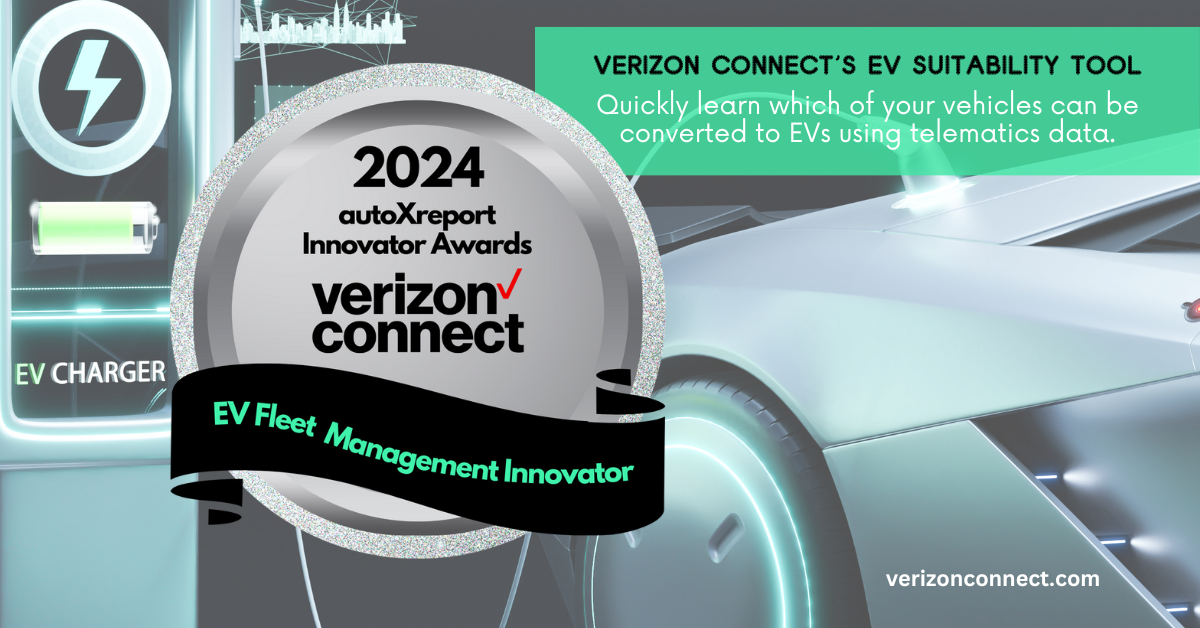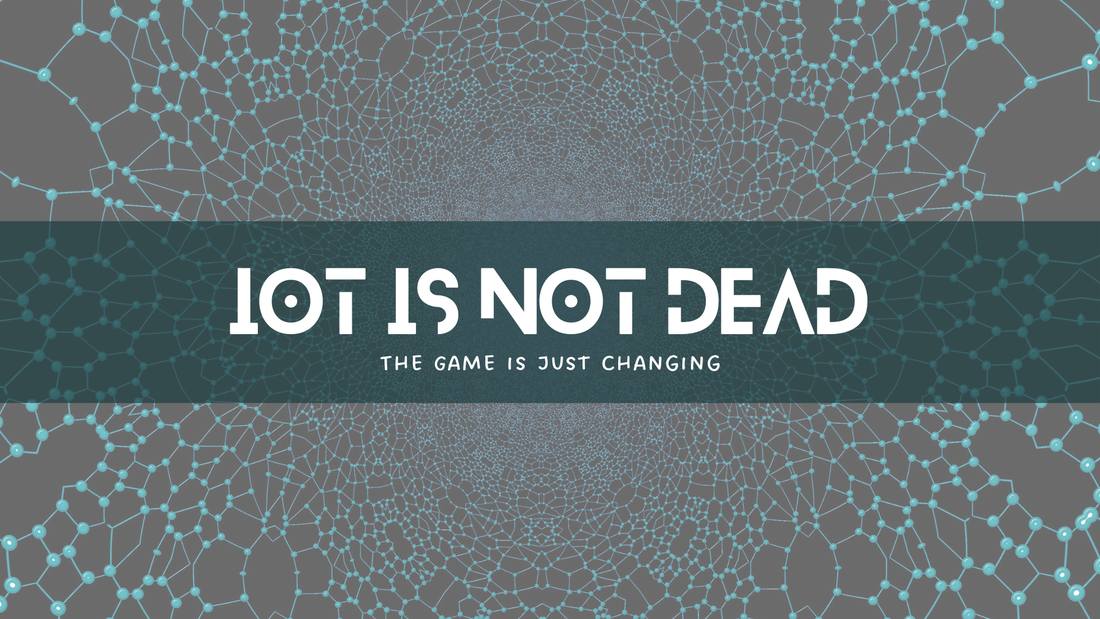|
Just after the hot off the press news of Verizon Connect winning the autoXreport Innovator award in EV Fleet Management, Stephanie Atkinson meets up with Ty Layman (Senior Manager, Product Marketing at Verizon Connect) to learn more about Verizon Connect and their drive to best serve the Fleet ecosystem. Check out their conversation below. Stephanie Atkinson, CompassIntel I want to congratulate you guys for winning the EV Fleet Management Innovator award for the AutoXreport Innovator Awards that were announced in February of this year. Can you tell me a little about Verizon Connect’s overall portfolio specific to electric vehicles and some of the emerging automotive space?! Ty Layman, Verizon Connect Verizon Connect’s primary product is called Reveal. What we're trying to do is just make fleet management easier for customers, and part of what we're trying to do is make it easy for customers to actually manage mixed fleets. The reality is most fleets are still internal combustion engine vehicles and so most telematics providers, including ourselves, help our clients manage their internal combustion engine fleets. from monitoring the fleets themselves on a live map to seeing where vehicles are currently located, to actually being able to create maintenance schedules within our platform and making safety easier for customers as well. We have the ability to monitor the speed of the vehicle, for example, and send an alert if the driver actually ends up speeding or is driving in a harsh manner. If there is hard breaking, or fast acceleration, then we can alert customers. We have monitoring reports that show day to day activities with your vehicles and full fleet, and provide driver behavior monitoring driving and other data to improve safety. As customers are moving more towards electric vehicles, this is going to be a process. It's going to be a little bit of adoption here and a little bit of adoption there. We're trying to provide those capabilities for those customers. Verizon Connect is supporting customers throughout their journey to EV. The tool that we have is to help customers actually make some initial determinations on which of their vehicles would be the best candidates to pursue EVs. We’ve also launched new capabilities to actually monitor those electric vehicles in the same sort of capacity that we have already allowed them to do from an internal combustion engine perspective. So, supporting customers with their current fleets because internal combustion engine vehicles are not going away, but also make certain we are on that leading edge of electric vehicles to support our customers. Stephanie Atkinson, CompassIntel It looks like you guys are playing in the full ecosystem from the manufacturing of the vehicles all the way to driver experiences and driver safety. So, let's dive a little bit more into what you just talked about, Verizon Connect’s EVs suitability tool. How does that work? Ty Layman, Verizon Connect The goal of the EV suitability tool is to help give customers perspective on how their vehicles are actually being used day-to-day to see whether EV would be a good fit for that specific vehicle. And, this tool helps look at an entire fleet. As customers are using data or using their vehicles and using our telematic solution, the system is collecting data on the usage of those vehicles, and this helps them with their fleet management of course, but the system is able to take that data and then determine which of the vehicles would be a good fit for transitioning to EV. It does this without customers actually having to send in any data inputs. Verizon Connect’s tool makes this process as seamless and easy as possible by collecting this data, utilizing it for the customers to advise them on which of their vehicles would be the best vehicles to go electric. The tool shares overarching fleet statistics and shares which vehicles of the fleet would be a good fit for EV including sharing the specific number of vehicles. It also shares fuel cost savings that a customer could expect as well as CO2 reduction. That data is used to help the calculations on how much fuel would you save if you converted these specific vehicles to EVs and then how much CO2 reduction. The other aspect of the tool is driving range, making certain that a vehicle will fit within an EVs range. The tool classifies vehicles into four different rankings. The first is an excellent fit to be an EV; the second is a good fit; third is an OK fit; the last one is non-EV suitable. An excellent fit means within the data range that we're looking at, which is usually about eight weeks, and is what the tool is bringing in that a vehicle was within the comparable range of an EV 100% of the time. We know many of our customers have sustainability initiatives that they are trying to meet. Stephanie Atkinson, CompassIntel Are you saying that it will identify the location and the relative vicinity of being able to charge and have access to the infrastructure that would be required…and different fleets have different driving areas, as some are driving in rural areas, and some aren't? Ty Layman, Verizon Connect It's actually simpler than that. It's more just driving distance for a specific day. It is identifying if an EV fits with the net range. For example, EV ranges that are actually on the lower end, many EVs can actually go farther, but we don't want to be giving customers bad data, so we stay conservative. If you charge at the beginning of the day and starting, then will the vehicles make it within that range without having to charge again? That’s what we're looking at including the battery life and the mileage because to your point, some of the more rural areas are not going to have the EV charging infrastructure that other areas might, and some customers are going to build out their own infrastructure. We look at employers who have home charging for their employee vehicles and fleets. What we have tried to do is basically say, ok, if we're going to give a recommendation, we want to be pretty confident about that recommendation. We look at those scenarios to determine how far the vehicle is going on this day. Stephanie Atkinson, CompassIntel That makes sense. That's perfect. What are some of the fleet types? Is it more government, such as police and EMT vehicles, or is it auto rental companies or other industry fleets? Ty Layman, Verizon Connect We work with a wide variety of different types of fleets, of all sizes. Anything from about five vehicles up to enterprise level, which is thousands of vehicles. For this analysis, it works within each of these, you just have to have the requisite data. If you have a fleet of five vehicles, they will look at all five of those vehicles at the time frame and determine if any of them would be suitable. And it may say no, your fleet at this time with the current technology is not best suited for an EV. When we do recommend EV, we provide three top recommendations. But customers can also go look in the data and find a specific vehicle. If a customer is not looking to replace one of those vehicles because the vehicle is still new, then we work with clients on that. If another vehicle is at its end of life, you can go look at that specific vehicle as well. Stephanie Atkinson, CompassIntel I know partnerships have continued to be an important strategy for Verizon Business and Verizon Connect. Can you talk more about your overall strategy and some of the key automotive partners that you work with or collaborate with? Ty Layman, Verizon Connect We understand we can't do everything, and there are many different companies that specialize in areas which we have no specific expertise or plans to operate in. We know that our customers are really utilizing many of these different companies. What we're trying to do is build our strategy for partnerships and build good relationships with the best of the best out there, and make certain we have the partners that our customers really want, really desire and not just necessarily fill our marketplace with just everybody. We always want to make sure that we're providing good recommendations to the top automotive companies. Stephanie Atkinson, CompassIntel That's great feedback. There are companies out there that develop a marketplace and it's just flooded, you know, they have thousands of partners that they'll list on there, but they're not actually doing business with them. So, I like to hear about the strategic nature of your relationships. So, let's talk a little bit about the key trends and some of the things that you guys are seeing with your own customers. I know you guys probably attend a lot of the big automotive conferences and events that take place every year. So, what are you hearing out there in terms of automation, AI, and other innovations? Ty Layman, Verizon Connect The core of what people are trying to do is still the same as they worry about increasing costs, whether it’s fuel costs increasing or just variability, and helping them improve safety (reducing accidents) and promote the safety of drivers and vehicles. Those are still the key areas that are top of mind for many of the customers that we work with. The customers see all the cool stuff out there but need to know how they can get those core things that they do as a fleet coordinated, cost-effective, safe and optimized. We've implemented AI technology, particularly in safety features, such as our integrated AI dash cam within our Reveal solution. This dash cam constantly monitors the road for potential threats and can detect various actions, like a driver using their phone or exhibiting signs of drowsiness. It provides alerts for such events and also identifies pedestrians and other hazards. Despite initial reservations, this technology can greatly benefit drivers, providing evidence for training purposes or in case of false accusations. Additionally, we offer tools for cost projection, including vehicle maintenance reports and fuel usage analysis through partnerships with fuel card providers. By integrating these features, we aim to provide comprehensive support for safety and cost optimization. Stephanie Atkinson, CompassIntel I was listening to you talk about the cameras and, and just the solutions overall and it sounds to me like a lot of more aftermarket, right? Because the automotive industry is also working on a lot of embedded technology in the dash, in the harnessing systems and other areas. Many of these vehicles come with their own software and platforms that users and drivers can log into. We’ve got these technology companies as well as the automotive manufacturers looking at it from both sides, but a lot of this comes together with software, data and you mentioned AI as well. So, it's good to hear what you guys are doing in the space specific to safety and support on the cost side. Ty Layman, Verizon Connect Yes, and one thing we are working on is integration. Our dashcams are part of our Reveal solution if customers choose to add dashcams to their existing subscriptions. The dashcam information is automatically uploaded into our system. So, for example, if the system detects a harsh driving event, it will automatically create a clip and upload that into our system, you don't have to go in after the fact and look through the entire SD card. We know that different companies are adding technology and services to and within the vehicles. We allow our customers to use these in whatever vehicle is appropriate for them. Our system can align with any manufacturer and it works, providing more flexibility in allowing the different types of vehicles that can be adopted in a fleet. Be sure and check out more on our Intelligent AI dashcam solutions. Stephanie Atkinson, CompassIntel And I'm sure in some particular fleets they've got some really legacy vehicles in their fleets that are still working and working well but they're not necessarily smart cars at all or have the intelligence that some of the newer ones have. I want to chat more about electric vehicles. As an industry, I think a lot of folks that are out there are looking at the market and we were so aggressive, hoping that things would move a lot quicker and that hasn’t happened. There have been a number of market challenges around infrastructure readiness and charging access, along with general buyer or driver acceptance. What are some of the things that you're seeing out there…and maybe some of the ways that Verizon is adapting to staying on top of this? Aside from the EV Suitability Tool, are there any other things that you might comment on to facilitate your customers around the adoption of EV? Ty Layman, Verizon Connect Well, the thing about EVs is customers totally get and understand internal combustion vehicles. Whenever customers purchase a new vehicle, that's still a fairly significant cost. So, if you have been doing this for a long time, you already have that knowledge. It's a known commodity, where an EV may be somewhat of an unknown so sometimes what we've been seeing is that even if the EV might be a good fit, there's just some hesitation because of the unknowns when it comes to maintenance schedules, electricity costs, charging installation, and more. Verizon Connect works to provide some of those answers as much as we can to help our customers. In addition, we've seen that once drivers start using the vehicles, once you get over that hump of the unknown, then EVs start to really be liked by drivers and then companies really consider full EV fleets. Companies will oftentimes have a mixed fleet. Customers like what EV offers, including the instant torque, and some understand they can do more with EVs. Once they know that it does fit within their driving range (mileage), then they also become more comfortable. We will see adoption continue. We've enhanced our product with EV features to address key customer concerns. We now display charging status on our live map, allowing fleet managers to track which vehicles are charging and available for dispatch. Additionally, managers and drivers can monitor battery levels in real-time to ensure sufficient charge for trips. Our system also provides detailed post-journey battery usage analysis, aiding in accurate planning. The "Replay" feature offers a comprehensive view of a vehicle's daily travel, including battery usage by segment. Furthermore, our charging history report offers insights into charging durations over time, empowering fleet managers with valuable data for optimization. When a customer makes those first EV investments, using Verizon Connect solutions, they can start to see how EVs and their fleet all work for their business, and then make informed decisions on when they can expand more broadly. Our approach to it is making certain that we can give the customers the data that they need to best manage their electric vehicles within their fleet, but also so that they can see what is working for specific vehicles. This also shows which vehicles they might not want to move to EV, or if they should keep some with internal combustion engines. Stephanie Atkinson, CompassIntel It sounds to me that the wealth of information you guys are pulling and providing to your fleet customers and showcasing a range of capabilities. I think this is also part of the journey as they transition or consider moving to EV. Education is part of the process for fleet customers, but also gives them that sense of security that they will have information to work with and to make informed decisions. Fleet managers and drivers may be more comfortable in their adoption as a result, and thus begin to make scale decisions. Ty Layman, Verizon Connect We don’t think that gas vehicles are going away anytime soon, but there will be a continued transition among fleets. There are viable use cases for both EVs and internal combustion vehicles and we're trying to make sure that we are properly positioned to help customers wherever they are. Stephanie Atkinson, CompassIntel What are we expecting over the next 2 to 3 years from the industry from Verizon Connect? What is on your horizon? What are you excited about? Ty Layman, Verizon Connect It’s an exciting time to be within this field as new fleets are adopting EV. Being on the cutting edge of that technology, at least for me, is what I am personally excited about. There is a little bit of unknown of what the adoption will be for EVs and what the emerging technologies that are coming. However, we're excited about helping customers throughout the entire process. We know that lots of customers will have specific goals in mind when it comes to cost production, when it comes to sustainability and that these are conversations that are happening more and more often, especially around the sustainability space. Companies also have sustainability goals themselves, and EV is part of that larger equation. We are also staying on top of new government regulations that might be happening while setting our customers up for success. So, it's an exciting time. It's one that we're really looking forward to being a part of, I'm very excited about it. As you can probably tell it, it's a space that I truly have a passion for…and so I'm looking forward to seeing what the future provides. Stephanie Atkinson, CompassIntel Can you tell everyone how we could learn more about you and how to access your website? Ty Layman, Verizon Connect Visit us at VerizonConnect.com, where you can review all the different capabilities that we have and view more on our partnerships. We have a marketplace on the site as well, where you can learn more about our EV suitability tool and all the services/solutions that we offer to our clients. The site is a great resource to learn more about us and what we provide. Links to additional resources and related information:
IoT is NOT dead, but the game is changing. When the term "IoT" took off, some experts and analyst firms categorized it as an industry. Some of us, especially the crew at IoT Coffee Talk, would get so aggravated at the blanket term of IoT when used to describe a narrowed market or a myopic description of the technology. IoT remains a blanket term used to describe things (i.e. assets, structures, tangible objects, mobile vehicles, items, etc.) being connected to the Internet. In 2010, Ericsson first shared there would be a projected 50 billion connected devices by 2020. That later was cut to 25 billion, and in the end was not the important factor. All of that, in my opinion missed the mark. Connections are connections are connections...Are the tech firms making money and are the businesses (clients) adopting and rolling out "IoT" seeing value?
While being connected is important...assets, for example, being connected really gain value when there are actionable insights, viable analytics, and the data can be used for business value. In addition, the tech companies providing IoT services and solutions (hardware, software, services, etc.) need to make money. So many businesses have come for the hype and left in debt, as they were never able to scale or offered no business value that made them margin. Now, let's get back to business value. Business value may include reducing costs, preventing failure or disruption, improving operations, bringing new revenue, offering asset visibility, meeting compliance requirements, and much more. The other important business aspect, is when we connect these "things," the business value becomes important only if it contributes financially to the business, presents a trackable ROI, and/or provides relevant business incentives. Many in the industry believe the hype of IoT is over, and it really is. Why though do I say that IoT is NOT dead. The industry is now transitioning away from using the terms IoT and IoT as a marketing term is fading, especially among other hype tech areas. IoT has always been about a particular industry and automating that industry. Technologists are realizing they must dive deeper and apply the technology to the specific industry, and apply context to how the tech will:
Automation can be defined as many things depending on who you talk to and what industry you are discussing, and "IoT" is just a tool in the tech tool belt at this point to support digital transformation, automation, and elevate the future of work. Yes, we can connect things but businesses and government organizations have reached a point of "so what."
IoT is NOT dead, the game is just changing. It is changing because we are moving to a point where we no longer call it "IoT." Those delivering solutions will just do what they should have been doing in the first place, and that is talking about the client's needs and applying the conversation to the value proposition to the industry, sub-industry, etc. In addition, AI has taken over as the new shiny thing. Artificial Intelligence and machine learning (models) essentially enable an IoT solution or further provide actionable insights, automation, and real-time intelligence. For those "IoT" companies that are still around, you have survived but you also will need to adapt. My advice is to not jump on the next shiny thing (many have been utilizing AI long before the hype entered), but to continue to provide context of your products and services and how it applies to your customer. If your customer is in the hospitality industry, then dive deep into that industry (travel, hotel experiences, occupancy optimization) and understand the traveler needs, apply your business development delivery in an intentional manner. Immerse yourself, do your research, train your teams, hire the experts, and be intentional. Find ISVs, VARs, and other partners to help your go-to-market, especially those that specialize in specific industries as they may "own" the customer. Collaboration will be essential. Just as in the rap industry, you have to collaborate to stay relevant! STAY TUNED, the IoT Innovator Awards by CompassIntel will open for nominations this fall! Hope on over to our AWARDS page to get your nominations in for the 11th annual CompassIntel awards. Let us know if you have any questions, just simply email us directly at [email protected]. |
Inside MobileCovering hot topics in the industry, new research, trends, and event coverage. Categories
All
|




 RSS Feed
RSS Feed
